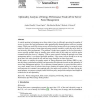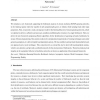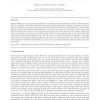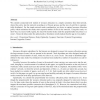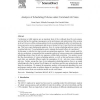146
click to vote
PE
2010
Springer
14 years 8 months ago
2010
Springer
In today's Internet, a large part of the traffic is carried using the TCP transport protocol. Characterization of the variations of TCP traffic is thus a major challenge, bot...
144
click to vote
PE
2010
Springer
14 years 8 months ago
2010
Springer
Accurately characterizing the resource usage of an application at various levels in the memory hierarchy has been a long-standing research problem. Existing characterization studi...
130
click to vote
PE
2010
Springer
14 years 8 months ago
2010
Springer
A central question in designing server farms today is how to efficiently provision the number of servers to extract the best performance under unpredictable demand patterns while ...
146
click to vote
PE
2010
Springer
14 years 8 months ago
2010
Springer
We introduce a new framework supporting the bottleneck analysis of closed, multiclass BCMP queueing networks in the limiting regime where the number of jobs proportionally grows t...
115
click to vote
PE
2010
Springer
14 years 8 months ago
2010
Springer
Current computer systems and communication networks tend to be highly complex, and they typically hide their internal structure from their users. Thus, for selected aspects of cap...
132
click to vote
PE
2010
Springer
14 years 8 months ago
2010
Springer
Fluid modelling is a next-generation technique for analysing massive performance models. Passive cooperation is a popular cooperation mechanism frequently used by performance engi...
132
click to vote
PE
2010
Springer
14 years 8 months ago
2010
Springer
We consider connection-level models of resource allocation in a simple symmetric three-link network, where files arrive into the network according to a Poisson process and the siz...
133
click to vote
PE
2010
Springer
14 years 8 months ago
2010
Springer
Performance prediction and measurement approaches for component-based software systems help software architects to evaluate their systems based on component performance specificat...
120
click to vote
PE
2010
Springer
15 years 13 days ago
2010
Springer
Correlations in traffic patterns are an important facet of the workloads faced by real systems, and one that has far-reaching consequences on the performance and optimization of t...
124
click to vote
PE
2010
Springer
15 years 13 days ago
2010
Springer
We introduce Bayesian Expansion (BE), an approximate numerical technique for passage time distribution analysis in queueing networks. BE uses a class of Bayesian networks to appro...

